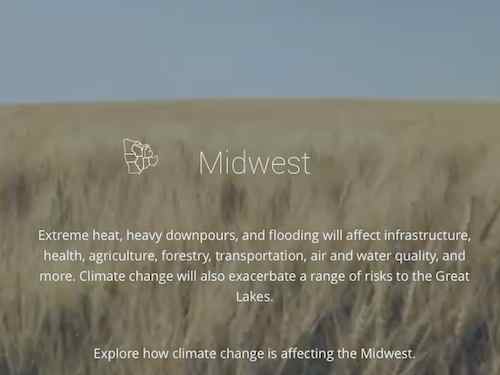Climate Change Is Here; Readers Think We Need To Do Much More Than We Are Currently
Yesterday a new report confirmed what many of us thought, that Climate Change is already underway:
Climate change is no longer a distant threat, but a real and present danger in the United States, according to a government report issued Tuesday. The report is the latest update from the U.S. Global Change Research Program, and details ways that climate change — caused predominantly by the emission of heat-trapping greenhouse gases — is already being felt across the country. (Huffington Post: Climate Change Is Already Here, Says Massive Government Report)

The following is from the Midwest region, which includes Missouri & Illinois:
Key Messages 1. In the next few decades, longer growing seasons and rising carbon dioxide levels will increase yields of some crops, though those benefits will be progressively offset by extreme weather events. Though adaptation options can reduce some of the detrimental effects, in the long term, the combined stresses associated with climate change are expected to decrease agricultural productivity. 2. The composition of the region’s forests is expected to change as rising temperatures drive habitats for many tree species northward. The role of the region’s forests as a net absorber of carbon is at risk from disruptions to forest ecosystems, in part due to climate change. 3. Increased heat wave intensity and frequency, increased humidity, degraded air quality, and reduced water quality will increase public health risks. 4. The Midwest has a highly energy-intensive economy with per capita emissions of greenhouse gases more than 20% higher than the national average. The region also has a large and increasingly utilized potential to reduce emissions that cause climate change. 5. Extreme rainfall events and flooding have increased during the last century, and these trends are expected to continue, causing erosion, declining water quality, and negative impacts on transportation, agriculture, human health, and infrastructure. 6. Climate change will exacerbate a range of risks to the Great Lakes, including changes in the range and distribution of certain fish species, increased invasive species and harmful blooms of algae, and declining beach health. Ice cover declines will lengthen the commercial navigation season.
The last section is “Response Strategies”, from the introduction:
People make choices every day about risks and benefits in their lives, weighing experience, information, and judgment as they consider the impacts of their decisions on themselves and the people around them. Similarly, people make choices that alter the magnitude of impacts resulting from current and future climate change. Using science-based information to anticipate future changes can help society make better decisions about how to reduce risks and protect people, places, and ecosystems from climate change impacts. Decisions made now and in the future will influence society’s resilience to impacts of future climate change. In recognition of the significance of these decisions, the National Climate Assessment presents information that is useful for a wide variety of decisions across regions and sectors, at multiple scales, and over multiple time frames. For the first time, the National Climate Assessment includes chapters on Decision Support, Mitigation, and Adaptation, in addition to identifying research needs associated with these topics.
The report is massive, I’ve only skimmed it a little. Here are the results from last week’s poll:
Q: Which of the following is closest to your current view on the environment
- We need to do much more to stop/reverse Climate Change 59 [71.08%]
- We’ve gone off the deep end worrying about global warming 10 [12.05%]
- We could do more, but there’s no need to be excessive 9 [10.84%]
- We’re doing all we can/should do 3 [3.61%]
- We’re fretting too much over the environment 2 [2.41%]
- Unsure/No Answer 0 [0%]
To those who say we’ve gone off the deep end, I suggest you buy ocean front property for your retirement years.
— Steve Patterson